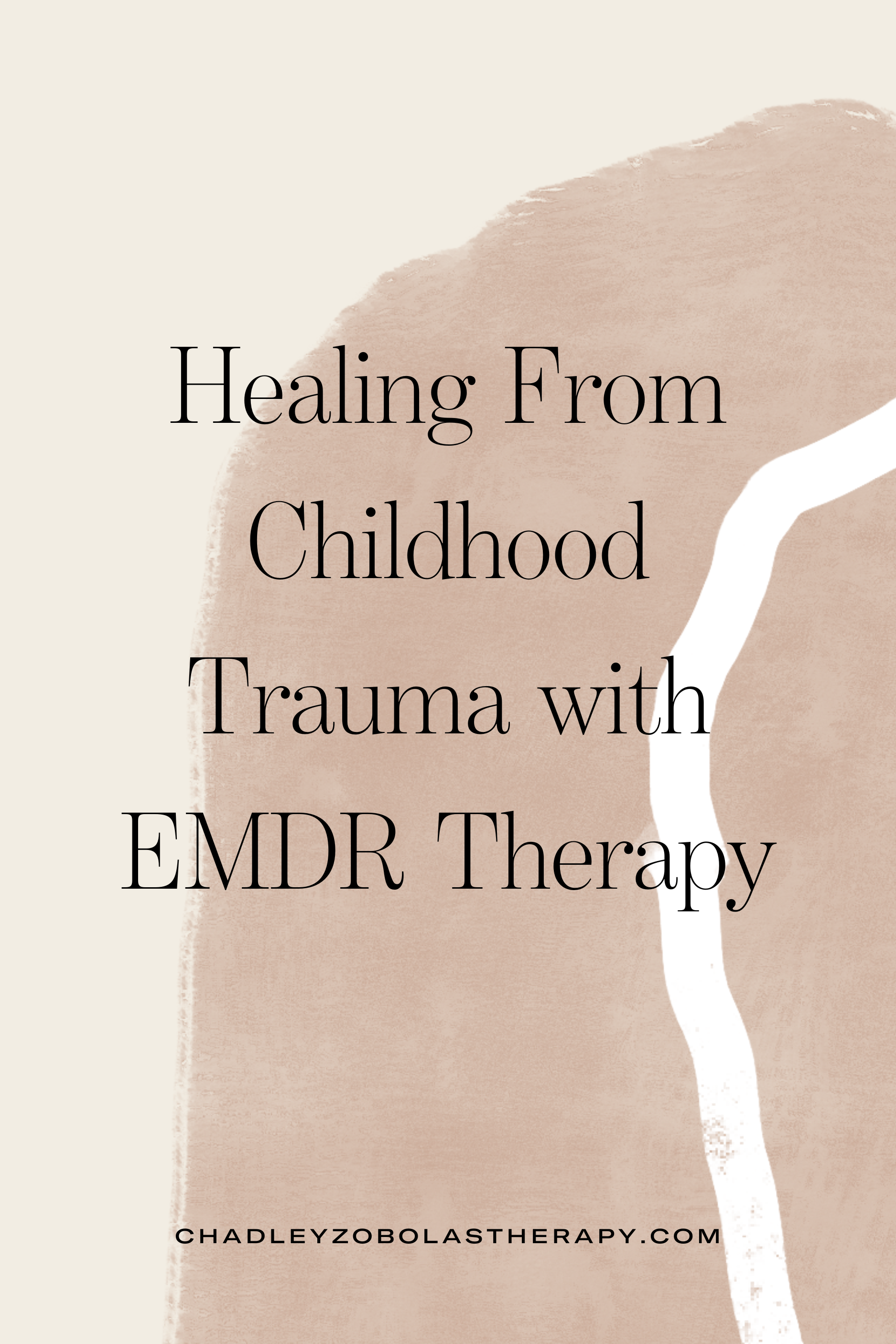Healing From Childhood Trauma With EMDR Therapy in Denver, CO.
By our team of denver emdr therapists at cz therapy group
Hey there! If you've been struggling with the lingering effects of childhood trauma, I want you to know that you're not alone. Many of us carry emotional burdens from our past that impact our present lives. But here's the good news: there's a therapy approach called Eye Movement Desensitization and Reprocessing (EMDR) that can help you heal those wounds and find a brighter future. In this blog post, we'll dive into the world of EMDR therapy, specifically focusing on its benefits for childhood trauma.
The Basics: What is EMDR Therapy?
First things first, let's demystify EMDR. At first glance, it may sound like a fancy scientific experiment involving lasers and robots, but fear not—it's much simpler than that. EMDR is a therapeutic approach that helps us process and release the emotional distress tied to traumatic experiences. It's like hitting the reset button on your mind and nervous system, allowing you to let go of the pain and reclaim your inner peace.
EMDR therapy is an evidence-based treatment developed in the late 1980s that has shown great promise in helping people overcome traumatic experiences. It's not your traditional talk therapy; instead, it uses a unique approach that incorporates bilateral stimulation. That means it stimulates both sides of your brain by using eye movements, tapping, or sounds. The bilateral stimulation helps reprocess distressing memories and promotes healing.
So, how does EMDR actually work? Well, it's all about the brain's innate ability to heal itself. During an EMDR session, your therapist will guide you through a series of eye movements, taps, or sounds, which may sound a bit strange at first. But trust me, these seemingly simple actions are designed to activate your brain's natural healing mechanisms.
As you engage in these bilateral movements, your therapist will guide you to focus on the traumatic memories, feelings, and beliefs associated with your traumatic experiences. But don't worry—it's not about re-living the trauma or getting stuck in the pain. Instead, EMDR aims to help you reprocess these memories in a more adaptive way, enabling you to let go of the overwhelming emotions, body sensations, and negative beliefs tied to them.
One of the incredible aspects of EMDR is its focus on the mind-body connection. Past trauma not only affects our emotions and thoughts but can also manifest in physical symptoms like headaches, stomachaches, or even chronic pain. EMDR addresses these physical manifestations by integrating the mind and body, allowing for a holistic healing experience.
Now, let’s explore how EMDR can specifically support you through the lingering effects of childhood trauma.
Childhood Trauma - A Bird’s Eye View
Childhood trauma can have a profound impact on our lives, affecting our emotional well-being, relationships, and even physical health. It can result from various experiences, such as abuse, neglect, accidents, or witnessing violence. These events can leave deep imprints on our minds, leading to feelings of fear, shame, guilt, or low self-worth. EMDR therapy offers a way to address and resolve these wounds, empowering you to move forward with resilience and strength.
Types of Childhood Trauma
- Emotional abuse: This can include constant criticism, humiliation, belittlement, or rejection from parents or caregivers, leading to long-lasting emotional wounds.
- Physical abuse: When a child is subjected to physical harm or violence, such as hitting, kicking, or punching, it can have a profound impact on their well-being.
- Sexual abuse: This involves any form of sexual contact or exploitation inflicted on a child, which can lead to deep emotional scars and affect their relationships and self-esteem.
- Neglect: When a child's basic needs, such as food, shelter, clothing, and medical care, are consistently not met by caregivers, it can result in neglect, leaving lasting emotional and physical consequences.
- Witnessing domestic violence: Experiencing or witnessing violence between parents or caregivers can be extremely distressing for a child, causing emotional and psychological trauma.
- Parental substance abuse: Growing up in an environment where parents or caregivers abuse drugs or alcohol can lead to neglect, emotional trauma, instability, and a higher risk of developing substance abuse problems in the future.
- Loss of a loved one: The death of a parent, sibling, or close family member can be profoundly traumatic for a child, causing grief, feelings of abandonment, and difficulty in forming healthy attachments.
- Bullying: Experiencing persistent bullying, whether physical, verbal, or online, can have long-term effects on a child's self-esteem, social skills, and mental well-being.
- Serious illness or medical procedures: Dealing with a severe illness or undergoing invasive medical procedures can be traumatic for a child, leading to anxiety, fear, and a sense of loss of control.
- Forced separation or immigration: Being forcibly separated from parents, displaced from one's home, or experiencing the challenges of immigration can cause significant trauma, feelings of loss, and adjustment difficulties.
Please remember that this list is not exhaustive, and every individual's experiences and responses to trauma can vary. It's important to seek support from aN EMDR Trained therapist who can help you navigate the healing process.
Three Ways EMDR Therapy in Denver, CO Can Help You Heal from Childhood Trauma
EMDR therapy is an increasingly popular modality of trauma therapy, and for good reason! Here are just three ways (of many) EMDR therapy can help you on your journey of healing:
1. Breaking the Cycle of Emotional Triggers:
EMDR therapy focuses on targeting and desensitizing specific traumatic memories that continue to impact your daily life. Through the bilateral stimulation techniques, your therapist will guide you through the steps to process these memories, allowing them to lose their emotional charge and release from their ‘stuck’ position in your nervous system. After you process a traumatic memory to completion, you may find that triggers that once overwhelmed you become more manageable, enabling you to respond differently to similar situations in the present.
2. Rebuilding Self-Esteem and Self-Worth:
Childhood trauma can profoundly affect our self-esteem, leaving us feeling unworthy of safe, reciprocal relationships and equal treatment. EMDR therapy works to reprocess negative beliefs and instill positive ones. Your therapist will help you identify the core negative beliefs associated with your trauma and guide you through a process of replacing them with more empowering and self-affirming thoughts. As a Colorado resident, you can reach out to connect with one of our skilled EMDR therapists at CZTG. Our Denver EMDR therapists specialize in childhood trauma and can support you on this transformative journey.
3. Restoring a Sense of Safety:
One of the core aims of EMDR therapy is to help you establish a sense of safety and control over your life. The therapy process promotes emotional regulation and equips you with coping strategies to manage distressing emotions. By resolving past trauma, you can create a foundation of security and build healthier relationships with yourself and others. You deserve to feel safe and secure in your life and your relationships - our team of EMDR therapists would love to walk alongside you in this process!
The EMDR Process - A Step By Step Overview from a Denver EMDR Therapist
EMDR therapy involves a structured, eight-phase approach that guides individuals through their healing journey. While each person's experience may differ, the general framework of EMDR typically includes the following stages:
1. History Taking: The therapist gathers a comprehensive understanding of the individual's history, trauma, and current concerns to formulate an appropriate treatment plan.
2. Preparation: The therapist equips the individual with various coping strategies and relaxation techniques to ensure emotional stability and resilience during the therapy sessions.
3. Assessment: The individual identifies a specific target memory or traumatic event to be addressed. They explore the associated negative beliefs, emotions, and physical sensations.
4. Desensitization: Using bilateral stimulation techniques, such as eye movements, sounds, or tactile sensations, the therapist guides the individual in re-experiencing the traumatic memory while maintaining a state of dual awareness. This process gradually desensitizes the individual to the distressing elements of the memory.
5. Installation: Positive beliefs and emotions are introduced, replacing the negative associations connected to the traumatic memory. This helps the individual reframe their perception of themselves and the event.
6. Body Scan: The therapist assists the individual in noticing any residual tension or physical discomfort associated with the traumatic memory, allowing for further processing and release.
7. Closure: At the end of each session, the therapist ensures that the individual is emotionally stable and provides them with self-soothing techniques to continue processing outside of therapy.
8. Reevaluation: In subsequent sessions, the therapist reviews progress and addresses any residual distress that may arise as the individual continues integrating the healing effects of EMDR.
Taking the First Step - EMDR Therapy in Denver, CO
EMDR therapy in Denver, CO, offers a beacon of hope for those seeking to heal childhood trauma. Through its unique approach of bilateral stimulation, EMDR can help you reprocess distressing memories, rebuild self-esteem, and restore a sense of safety in your life.
It’s important to note that healing takes time and courage. EMDR therapy is not a quick fix, but a journey towards reclaiming your authentic self. It's about releasing the grip of childhood trauma and stepping into a life filled with joy, love, and endless possibilities.
So, if you're ready to embark on this transformative adventure, take that brave step and reach out to a Denver EMDR therapist at CZ Therapy Group. Together, we can unravel the layers of your experience, begin the healing journey together, and co-create a new path of resilience and growth. Follow these three simple steps to get started:
Reach out to schedule a free 20-minute consult call.
Connect with the CZTG EMDR therapist of your choice via a phone consult.
Begin healing and growth in weekly trauma therapy




